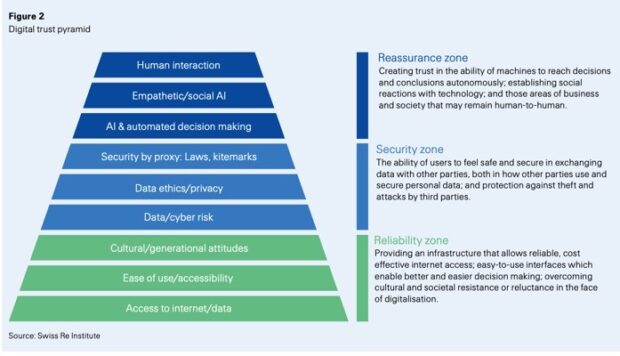Trust in artificial intelligence (AI) varies depending on how digitally advanced a country is, a recent study by the Swiss Re Institute found.
In advanced digital economies, a third of respondents on average in each country understand and trust AI.
Digital trust is influenced by a variety of psychological factors such as cultural and generational attitudes, trust in institutions, incidence of online fraud, ease of use and grasp of technology, the report found. In terms of psychological factors, the report highlights two types of thought processes: System One and Two.
System One is instinctual and emotional while System 2 is slower and more logical.
As can be expected, System One thinkers may be too generous with their data when using AI technology. Rash decision-making might lead to regret later, the study found.
“System One thinking helps dismantle digital inhibitions. It can allow and even encourage individuals to be generous, sometimes to the point of being reckless, with their data,” the report stated.
But System Two thinking as it relates to data sharing can be problematic, too, the findings indicate. Sharing data as a trade for services or use of a product seems like a rational decision, but with trust in certain brands, is there too much reliance on the belief ethical and legal codes exist protecting the data?
Another factor impacting trust in AI is a person’s psychological type. There are five types that can influence how we perceive data safety.
Digital trust isn’t always correlated with how advanced an organization’s digital infrastructure is.
The study also found that cultural and societal attitudes impact digital trust significantly, contributing up to 95 percent of variance in digital trust between country clusters.
Generational attitudes and ease of use can also impact digital trust, analysis found.
The digital trust gap can be bridged using a customer-centric approach, offering consumers a sense of control over their digital data footprint, Swiss Re found.
Insurers can enhance digital trust in AI by designing products and services to give consumers the flexibility in controlling their data.
In addition, digital trust can be strengthened through transparency in data transaction, the report stated.
“An optimum degree of customization and personalization, convenience in digital interactions and sometimes by offering financial rewards in exchange of data,” can also enhance trust in AI.





















 Premium Slowdown, Inflation Factors to Lead to Higher P/C Combined Ratio: AM Best
Premium Slowdown, Inflation Factors to Lead to Higher P/C Combined Ratio: AM Best  AI Got Beat by Traditional Models in Forecasting NYC’s Blizzard
AI Got Beat by Traditional Models in Forecasting NYC’s Blizzard  State Farm Mutual to Pay $5B Dividend to Auto Insurance Customers
State Farm Mutual to Pay $5B Dividend to Auto Insurance Customers  From Skill to System: The Next Chapter in Insurance Claims Negotiation
From Skill to System: The Next Chapter in Insurance Claims Negotiation 